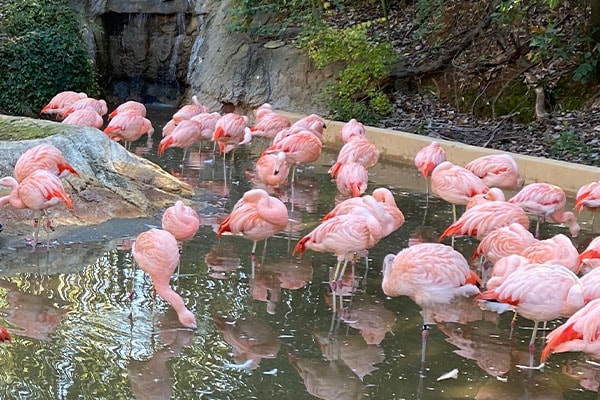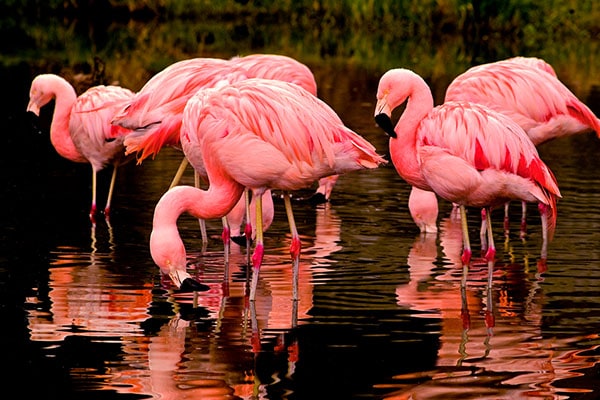Contents
Flamingos are probably one of the most identifiable bird species in the world, thanks to their distinct pink color. However, have you ever wondered why flamingos are pink?
It turns out that flamingos aren’t really born pink. However, their pink pigment came from what they eat, which are generally crustaceans and algae. And because of that, their feathers turn pink.

Of course, the explanation of this is much more complex. And that’s why in this article, we’ll go deeper on this interesting fact about flamingos and discuss the following:
- Flamingo Diet
- Why Flamingos are Pink
- More Interesting Facts About Flamingos
- FAQs
So, if you’re ready to know more about these unique birds, read on…
About Flamingos
Flamingos are known for their pink feathers, stilt-like legs, and boomerang-shaped beaks. They are one of the very few distinctive bird species. In fact, when someone says “flamingo”, one word comes immediately to mind – pink.
Even little kids would quickly know what a flamingo is.
The name flamingo came from the Spanish word flamenco, which means flame-colored. This is mainly because of their bright flame-colored feathers.
There are only six known species in the world, all showing the same distinctive pink-feathered feature:
- Greater Flamingo
- Lesser Flamingo
- Chilean Flamingo
- James’s Flamingo
- Andean Flamingo
- American Flamingo
Out of the six, the Greater Flamingo is the most widespread and is found in parts of Africa, South Europe, and South and Southwest Asia.
Other than flamingos in captivity, you won’t find many flamingos in the US. The only flamingo species you’d find in the US would be the American Flamingo, also known as the Caribbean Flamingo that breeds in Southern Florida. You’ll also see them throughout the Caribbean, the Yucatan Peninsula of Mexico, and on the northern coast of South America.
Another impressive fact to know is that the American Flamingo is the pinkest of all. They measure around four feet tall and have a wingspan of about five feet. And since these birds are non-migratory, seeing them would mean traveling hundreds of miles.
These birds live in salt marshes and mudflats, which provide them with all the food they need, including small shrimp, mollusks, algae, seeds, and other microscopic organisms.
In a natural habitat, you’ll immediately notice that these birds are highly sociable. They usually gather in large flocks or colonies of thousands of birds. This way, they can easily avoid predators, maximize their food intake, and use nesting sites efficiently.
Related Posts:
The Flamingo Diet
Flamingos are omnivores. Their diet mainly consists of larva, small insects, blue-green and red-algae, mollusks, crustaceans, and small fish.
These birds are filter feeders. This means that once they intake food, their beaks can filter that out to ensure that they won’t intake mud. They will stir up the bottom of the lake with their feet, duck their beaks down to catch their meal beneath the mud and water.
Why Flamingos Are Pink
Now, we did mention that flamingos are pink only because of the food they eat. And this is true.
These birds weren’t born pink. Instead, they are born grey or white and only turn pink over the years because of their diet.
As mentioned earlier, the flamingo’s diet consists of algae and crustaceans, organisms rich in alpha and beta carotenoid pigments. If you haven’t heard of the term carotenoids, these are the same substances that make carrots orange. In other words, depending on what they eat, the color of flamingos’ feathers can vary from a shade of orange to pink.
Even while in captivity, keepers would ensure that flamingos follow a specific diet that will help keep their feathers pink at all times because a certain change can turn their feathers paler.
In other words, Flamingo feathers are pink because the food they eat is rich in carotenoids. And if they change their diet or start eating food with no carotenoids, their color can go back to its original, which is a pale grey or white.
More Interesting Facts About Flamingos
- Flamingo nests are made of mud and resemble a mud-like volcano.
- Flamingos turn their heads upside-down to eat.
- A group of flamingos is called a flamboyance. There are also other terms which include stand, colony, and pat.
- There are only six flamingo species in the world.
- Flamingos’ knees don’t bend backwards. What you can see as flamingos’ knees are their ankles. The knees are hidden far up to their body. This means that flamingos are actually on tiptoes!
- Flamingos can sleep while standing on one leg.
FAQs About Why Flamingos Are Pink
Why are flamingos pink?
Flamingos are pink mainly because of what they eat – algae and crustaceans. These creatures are rich in alpha and beta carotenoids, the same substances that make a carrot orange, turning flamingo feathers pink as well.
This means that if flamingos change their diet or their food would no longer be rich in carotenoids, their pink color may fade, transforming it back to the original grey color they have.
Is flamingo poop really pink?
No, flamingo poop is not pink.
This is a common question asked, mainly because people thought that if crustaceans turn flamingo feathers pink, it will turn poop pink as well. But no. Flamingos poop are the same grayish-brown color that other birds have.
However, newly-hatched flamingos have a slightly orange poop, but only because they need to release or process the yolk, they lived off inside the egg.
Why are flamingos not born pink?
Flamingo chicks, when hatched, have a dull gray color. This is because they haven’t eaten food rich in carotenoids yet. However, their feathers will change color once they start growing and eating the same diet as other flamingos.
What is flamingo milk, and why is it pink?
Flamingo milk is called crop milk.
When you find flamingo parents feeding their young, it can be a horrifying sight, especially as the milk resembles blood due to its pinkish or reddish color.
Both parents produce crop milk. As these birds don’t have mammary glands, they feed chicks with liquid secretions they produce in their throat and feed it to their chicks through their beaks.
The very reason why this milk is pink is mainly because of the birds’ diet. This crop milk is also rich with carotenoids that they can pass to their young, turning the young birds’ feathers to pink, little by little.
It is said that this crop milk is super rich in carotenoids, that parent birds tend to fade color when they give some of this milk to their young.
Do Flamingos turn blue?
No, Flamingos don’t turn blue.
Again, this is another myth thought by many people. Just because flamingos turn pink because of carotenoids, they can turn blue as well when they eat blue or green food.
Flamingos’ bodies are generally designed to pick up and metabolize red and green pigments, causing them to change color. They don’t do this with blue or green pigments. So, stop hoping that you’ll find a blue or green Flamingo anywhere.
Final Thoughts About Why Flamingos Are Pink
And that’s why Flamingos are pink.
It’s not only because they eat a lot of shrimp, but it’s generally because they eat food that is rich in carotenoids. And because their bodies are designed to metabolize pink and red pigments, their feathers start changing color, too.
It’s a very interesting fact, which almost sounds like flamingos are dyeing their feathers of carotenoids. And if they deplete carotenoids from their bodies, like through the crop milk, they also turn pale or white.

